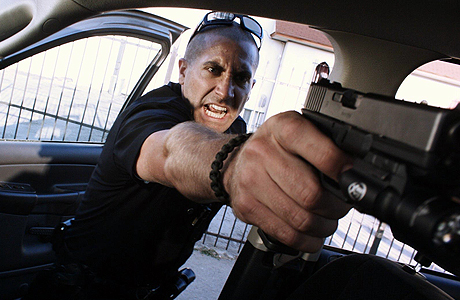No matter how well a movie involving time travel is done, it is inevitably going to have plot holes. There’s just no way to properly navigate a theoretical construct that defies one’s linear sense of time. Back to the Future, Frequency, Twelve Monkeys – they are all riddled with such immense inconsistencies that if one were to stop and flesh out those problems, these otherwise entertaining narratives would completely derail. And while Looper, from writer/director Rian Johnson, is not without a paradox or two, it remains an interesting exercise in telling a time bending narrative while staying true to the film’s own inherent sense of logic. But like many others of this genre, it leaves you with as many questions as it does answers.
This film is a tough one to tackle without revealing spoilers, but what I can safely reveal is that thirty years from the film’s present day, time travel will be invented and for reasons explained in the film, criminal organizations send undesirables back in time for execution at the hands of low rent assassins called loopers. The loopers perform these duties while knowing that one day they will be sent to retirement on the day they are faced with assassinating their future self – an act dubbed closing out the loop. Joseph Gordon-Levitt plays Joe, a looper whose life unravels when he not only fails to assassinate his older self (played by Bruce Willis), but also finds that his future self is a man with a very specific plan.
Based on who you talk to, Looper is either an incredibly complex and highly layered narrative loaded with parallels, innuendoes, philosophical ruminations, and clever plot twists; or it’s another in a long line of action filled time travel movies loaded with a bunch of red herrings designed to trick the viewer. I am inclined to agree more with the former than the latter. Is it as complex as some would have you believe? No, but there is a circular nature to the plot of the movie that not only begs you to ask a bunch of questions, but demands that you not watch the movie passively as a single straight-line narrative. It’s not as complex or mind bending as Inception or Matrix, but it is a sound writing effort that leaves just enough loose ends (as well as the chicken and the egg paradox) for you to formulate your own conclusions. It’s the kind of movie that you will discuss with your friends after the fact, and will send you across the web looking for those hidden clues you might have missed.
The best part of this movie hands down is the acting. Most everyone of significance in the cast deliver strong performances. Like many actors before him (Pacino, DeNiro, Stallone), Bruce Willis has long since started down the path to becoming a caricature of himself, but in this film it feels like Willis is turning back the clock to deliver a strong performance as a complex and conflicted character. Truth be told, it is the first time in a long time that it feels like he cares about a role and movie; it appears as though Willis is actually trying. As for Joseph Gordon-Levitt, he proves once again that he is one of the better actors working today. He does a great job of channeling Bruce Willis, not to the point that it feels like a straight impersonation, but just enough so that it feels like his Joe and Bruce Willis’ are separated by a deep chasm born from thirty years of experience.
As for the rest of the cast, Emily Blunt does a great job of exchanging her lovely British sensibilities for a midwestern accent, farm attire, and a double barrel shotgun, almost completely disappearing into the role of Sara. Jeff Daniels is very good as Abe; his scenes opposite Gordon-Levitt represent some of the best dialogue in the film. Paul Dano continues to carve out a niche playing the same bumbling sympathetic sad sack always destined for disaster and Noah Segan and Piper Perabo physically embody the decay of the dystopian present in which the plot unfolds.
While I believe that the writing is layered and cleverly open ended and the acting very good, I feel as though this is one of the films where the whole is not greater than the sum of the parts. There are choices made in this film that are admirable, but those choices alter the tone of the film a bit and throw off the pacing in the second act. Still, the work of the cast more than makes up for these shortcomings. While I did not walk out of the theater as enamored with the film as many other people (and some of this is probably born from lofty expectations), I found the film to be entertaining and would feel compelled to see it again. Something tells me that a second viewing would lend clarity to the questions I have been mulling since seeing the movie. I would definitely recommend this for a theatrical viewing (and probably a second viewing on DVD), but caution you to be ready to think.
Standout Performance: Joseph Gordon-Levitt. There is very little that he and Bruce Willis have in common in regards to looks, voice, mannerisms, and persona, and this makes it all the more impressive that he could stand opposite Willis in this movie and completely sell himself as a younger version of the man.




























































